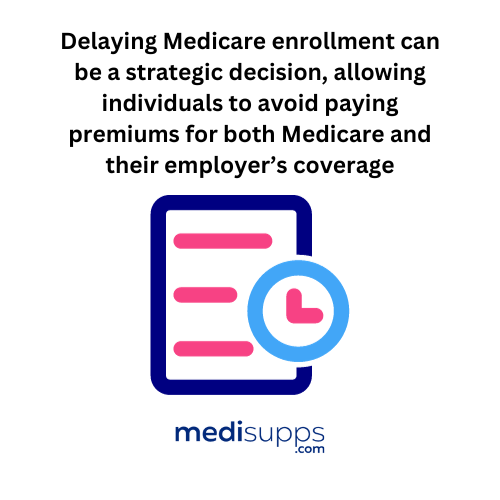
by Russell Noga | Updated October 28th, 2023
What Happens to My Spouse's Health Insurance When I Go on Medicare?
 Navigating the world of health insurance can be a daunting task, especially when you or your spouse become eligible for Medicare.
Navigating the world of health insurance can be a daunting task, especially when you or your spouse become eligible for Medicare.
How will this affect your spouse’s health insurance coverage? What options are available for your spouse if they lose their employer-sponsored insurance?
In this blog post, we’ll explore the impact of Medicare enrollment on your spouse’s health insurance and provide valuable guidance to ensure a smooth transition, answering the question: what happens to my wife’s health insurance when I go on Medicare?
Key Takeaways
- Understand the individual nature of Medicare and how it can affect your spouse’s health insurance coverage.
- Explore options such as COBRA, private insurance, public marketplace or a spouse’s plan when enrolling in Medicare first.
- Consider strategies for delaying enrollment and special enrollment periods to ensure a smooth transition to Medicare.
Understanding the Impact on Your Spouse’s Health Insurance
Enrolling in Medicare can significantly impact your spouse’s health insurance coverage due to its individualistic nature. Unlike other health insurance programs, spouses do not share benefits under Medicare and must each have their own separate plans.
Additionally, Medicare enrollment can affect employer-sponsored insurance, which may also impact your spouse’s employer coverage.
The Individual Nature of Medicare
Medicare operates on an individual basis, catering to each person’s unique eligibility and circumstances. Given its individualistic approach, Medicare does not allow spouses to share benefits.
Each person needs a separate Medicare plan, with reimbursements based on individual coverage. In this context, Medicare pays for each person’s healthcare needs separately.
Consequently, your spouse will need to explore alternative options, such as individual health insurance, as they cannot have the same health benefits as you on Medicare.
Employer-Sponsored Insurance Considerations
The impact of Medicare enrollment on employer-sponsored insurance for spouses depends on the employer’s rules and coverage options.
You should contact your employer before deferring Original Medicare to better understand how it interacts with group health insurance.
Your spouse may be able to enroll in Parts A and B while remaining on your current employer’s health insurance as a dependent. In such cases, Medicare would process medical bills first, with the group health insurance covering services not covered by Medicare.
For a seamless transition, keep open lines of communication with your employer benefits administrator and health care providers to grasp the options available to you.
View Medicare Rates 2024
Enter Zip Code
Navigating Different Medicare Enrollment Timelines
Medicare enrollment for medicare beneficiaries is associated with an individual’s 65th birthday, with the Initial Enrollment Period (IEP) beginning three months prior and ending three months after they turn 65.
If one spouse becomes eligible for Medicare before the other, it may be because the spouse is older. The impact on health insurance coverage will depend on the employer and their regulations concerning covered dependents of Medicare age.
If both spouses become eligible for Medicare concurrently, they must enroll separately, each completing their own individual Medicare enrollment process.
When You Enroll in Medicare First
Should you be the first to enroll in Medicare, your spouse might need to explore other coverage options until they become eligible. These include:
- COBRA
- Private insurance
- Public marketplace
- A spouse’s plan
- Medicare Advantage Plans
You should carefully consider the costs and benefits of each option. For instance, maintaining COBRA continuation coverage could mean you have to pay premiums, including the full monthly premiums and an additional 2% administrative fee.
When Your Spouse Enrolls in Medicare First
If your spouse enrolls in Medicare first, you may need to maintain your employer-sponsored insurance or explore other coverage options.
Your spouse may choose to postpone enrolling in Part B until you are enrolled in Medicare, provided they were covered by your insurance and there is no penalty for the postponement.
Engaging your employer’s benefits administrator will shed light on how Medicare integrates with your employer-provided health plans and facilitate a smoother transition.
Premium-Free Medicare Part A for Non-Working Spouses
Non-working spouses can qualify for premium-free Medicare Part A if their partner has worked and paid Medicare taxes for at least 10 years. Premium-free Medicare Part A coverage remains with the individual upon divorce or after a specified period following the death of their spouse.
Consequently, your spouse could still qualify for Medicare coverage based on your employment history, even if they have not worked.
Strategies for Delaying Medicare Enrollment
 Delaying Medicare enrollment can be a strategic decision, allowing individuals to avoid paying premiums for both Medicare and their employer’s coverage.
Delaying Medicare enrollment can be a strategic decision, allowing individuals to avoid paying premiums for both Medicare and their employer’s coverage.
Some individuals may wait to join Part A while they are still working in order to contribute to a health savings account.
Keep in mind that new HSA contributions stop once you enroll in Part A or Part B of Medicare. Grasping the reasons for delaying Medicare enrollment and the variety of strategies can guide you in making well-informed decisions.
Special Enrollment Periods
Special Enrollment Periods (SEPs) allow eligible individuals to delay Medicare enrollment without penalties if they have employer-sponsored insurance.
The 8-month SEP plan starts when either you or your spouse loses their job. Alternatively, it begins the month after the group health policy ends, whichever comes first.
To sign up for Medicare SEP, you’ll need to visit the Social Security Administration website and complete the required forms, ensuring you meet the eligibility criteria.

Options for Spouses Losing Health Insurance Coverage
For spouses who lose health insurance coverage due to their partner’s Medicare enrollment, several options are available to maintain coverage. These options include:
- COBRA
- State health insurance exchanges
- Private insurance
- Medicaid
Each option presents different health insurance benefits and costs. Carefully considering these factors will help you choose the health plan that best meets your needs.
Communicating with Your Employer
Keep an open dialogue with your employer during your transition to Medicare. They may offer retiree health benefits or other options to supplement your Medicare coverage.
Employers may also have specific procedures or requirements for transitioning to Medicare, such as providing documentation or notifying them of enrollment.
Discussing your plans with your employer can help ensure a seamless transition and prevent potential gaps in coverage.
Medicare Coverage for Spouses with Disabilities or Medical Conditions
Medicare coverage is available for certain individuals with disabilities who are under the age of 65 and have received Social Security Disability benefits for 24 months.
Spouses may also qualify for premium-free Medicare Part A based on the work record of their spouse or a former spouse.
Also, Medicare eligibility and coverage do not consider preexisting or prior health conditions, enabling spouses to choose a Medicare plan tailored to their needs.
Summary
In conclusion, understanding the impact of Medicare enrollment on your spouse’s health insurance is crucial to ensure a seamless transition. By considering the individual nature of Medicare, employer-sponsored insurance considerations, and different enrollment timelines, you can make informed decisions to maintain adequate coverage for both you and your spouse.
Remember, communication with your employer and exploring available options is key to navigating the Medicare enrollment process with confidence.
Get Quotes in 2 Easy Steps!
Enter Zip Code
Frequently Asked Questions
When I get Medicare is my spouse covered?
Unfortunately, Medicare does not cover spouses specifically so they need to qualify individually, as well as enroll when they are eligible.
Do I need to enroll in Medicare Part B if my spouse is still working?
In many circumstances, you do not need to enroll in Medicare Part B while your spouse is still working and has employer-based group coverage that is credible and you are insured on the policy. Check with your spouse’s benefits department to confirm whether or not you must enroll in Medicare Part B.
You may wait until they stop working (or lose their health insurance) to sign up for Part B, without incurring a late enrollment penalty. However, it’s important to confirm with the employer about what you need to do when you turn 65.
How does Medicare work if you have other insurance?
If you have both Medicare and other health insurance, the primary payer pays what it owes on your bills first, and then the secondary payer pays. Medicare is usually considered the primary payer if you work for a company with fewer than 20 employees.
Otherwise, your employer-based coverage is usually considered the primary payer with Medicare as secondary. After the coordination period ends, Medicare pays first and your other coverage pays second.
Can my spouse and I share the same Medicare plan?
No, spouses cannot share the same Medicare plan as it is an individual health insurance program.
What is a Special Enrollment Period (SEP), and who is eligible for it?
A Special Enrollment Period (SEP) allows individuals turning 65 who are still covered by employer-sponsored health insurance to enroll in Medicare or outside the annual open enrollment period without incurring any penalties.
Eligibility for a SEP is granted if an individual is still covered by employer-sponsored health insurance, either through themselves or their spouse.
Find the Right Medicare Plan for You
Finding the right Medicare Plan 2024 doesn’t have to be confusing. Whether it’s a Medigap plan, or you want to know what happens to my spouse’s health insurance when I go on Medicare, we can help.
Call us today at 1-888-891-0229 and one of our knowledgeable, licensed insurance agents will be happy to assist you!

Russell Noga is the CEO and Medicare editor of Medisupps.com. His 15 years of experience in the Medicare insurance market includes being a licensed Medicare insurance broker in all 50 states. He is frequently featured as a featured as a keynote Medicare event speaker, has authored hundreds of Medicare content pages, and hosts the very popular Medisupps.com Medicare Youtube channel. His expertise includes Medicare, Medigap insurance, Medicare Advantage plans, and Medicare Part D.


